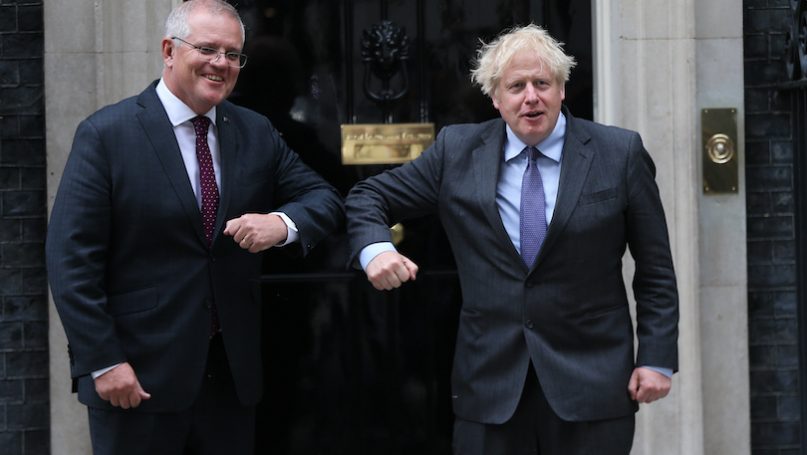
London’s bid for a post-Brexit independent globalized foreign policy – coined ‘Global Britain’ – has led to a ‘tilt’ towards the Indo-Pacific welcomed by Australia. The signing of the AUKUS security pact cemented this approach, formalizing the active presence of the UK in the Indo-Pacific beyond mere rhetoric while asserting the reinvigoration of the US as a defence player in the region. For Australia, while AUKUS emerged as a “forever partnership” fulfilling its dreams of obtaining nuclear-power submarines, the pact strengthened not just its alliance with the US but also the bilateral it shares with UK. Enhancing such momentum, especially as both UK and Australia find convergence in their focus on the Indo-Pacific, unique ideations must be explored to further build the “new partnership from a historic alliance” in order to make it “fit for the next century”. The Commonwealth Framework emerges as one such avenue which can refashion its well-established structures into modernized geopolitical value shaping the power-politics of the region.
AUKUS had massive impacts on partnerships of the three signing powers with their partners beyond the pact; France’s anger at the sudden displacement of its own deal with Australia wrung loud, affecting its ties with trans-Atlantic partner US and as recently as February 2022, led to Paris dropping Canberra as an “key” Indo-Pacific partner. The UK, however, emerged as the biggest winner of the AUKUS signing, avoiding massive repercussions from France but getting the better end of the deal with US and Australia. However, within the same dynamic, it becomes important to note that the growing UK-Australia synergy also taps into their historic connect via the Commonwealth framework, which in turn has massive potential to promote their engagement beyond conventional rhetoric.
The UK Commonwealth is essentially a political association connecting fifty-four former British colonies across the Pacific and four continents. By sheer size and number, the Commonwealth remains well-placed to further London’s ‘Global Britain’ influence, if remodelled slightly along the lines of present geopolitics. At a time when its need, validity and continued induction have become topics of debate, a revitalization of its use –owing to its already well-established institutions, funds and reach –is not unimaginable. Much like the Quad’s goal of bringing together ‘like-minded’ democratic countries, the Commonwealth is already built with countries that share the Westminster system of governance and practice international law.
As a founding member of the modern Commonwealth, Australia’s active participation in the promotion of “human rights, democratic norms and good governance among member countries” has been noteworthy, with it being the third-largest contributor to the Commonwealth budget. The Australian Commonwealth remains the largest funder of the Australian health system providing almost sixty percent of total government health funding, while sub-frameworks like fraud detection, procurement and resource management among others remain well established.
UK and Australia, despite AUKUS (which is a defence pact), are not allies with a formally signed alliance; the true potential of their growing linkages remains unfulfilled due to such a gap. The Commonwealth can emerge as a multilateral gathering which can lead the execution of mutual non-conventional security, people-people and economic goals in the backdrop of building deeper trust in security and defence domains. Australia –and India –as Commonwealth and Quad countries can guide the linking of the framework with the Indo-Pacific and Asia in more comprehensive terms. Importantly, the Commonwealth’s own mission of “focus for promoting democratic practice and development, standing up for the values of freedom, fairness and responsibility” stands in line with that of the Quad, paving the room for a Quad Plus tangent with the UK and a stronger anti-authoritarian power vision vis-à-vis China, Russia and North Korea.
By virtue of its membership variety, a strong and focused littoral states connect can be fashioned under a Commonwealth linkage with national ventures of both UK and Australia such as Global Britain and Pacific Step-Up. Most Pacific Commonwealth countries are in Australia’s eastern Pacific Ocean, making Canberra a critical geopolitical partner. The Pacific Step-Up here offers greater collaboration opportunities, especially as it keeps a key emphasis on Pacific Island littorals. Importantly, the Australian Step-Up also remains to have its true potential unlocked –especially vis-à-vis the Quad countries, and a Commonwealth connect could only further that synergy.
For London, a Commonwealth connect would – with the British monarch as the head of state – provide stronger maritime security and geoeconomics opportunities to critical British Overseas Territories (BOTs) like the Pitcairn Islands (which is the sole UK BOT in the Pacific Ocean) and British Indian Ocean Territory. Such a unique ambit could also deepen the UK-ASEAN linkage with the merging of the Department for International Development (DFID) into the Foreign Commonwealth Office (FCO) already being well-placed to guide the logistics. Ultimately, as UK looks to rebuild its place as a resident power in the Indo-Pacific, it has the potential to utilize one of the world’s oldest institutional frameworks into a connect that gives it exclusive access to bridge its Indian Ocean focus with states in the Pacific that were once former colonies.
The push for a Commonwealth link stems from the opportunity of refashioning of a historic network rather than creation of an altogether new venture. The ideation is not along the lines of security and defence, but economic growth and trade. Furthermore, it would allow a chance to improve the colonizer-colony narrative for the British monarchy, which has over the years faced increasing backlash on the same. For Australia, the Commonwealth connect would only deepen existing links with powers like India and others, allowing it to push forth its own strategies while aiming to reach the true potential of its Quad membership, AUKUS and growing Indo-Pacific role.
Further Reading on E-International Relations
- Brexit: Can the Commonwealth Fill the Gap?
- What Can a Japan-US-India-Australia Cooperation Do?
- China’s Political Economy and the UK Post-Brexit
- Panic Stations: Australia’s Scramble to Defend Against China in the Asia-Pacific
- Should Australia Establish a Modern Slavery Act?
- Opinion – Getting Diversity ‘Right’ In Australia’s Nascent Space Industry Matters